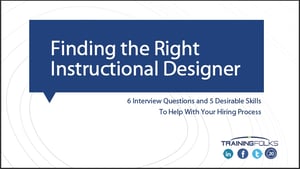How to Find the Right Contract Instructional Designer
The Instructional Designer is responsible for consulting with identified stakeholders to conduct a learning needs analysis for an identified target audience, complete low/high and detail level design documents to address knowledge and/or performance gaps, and develop training materials to support learning that will foster accelerated change, drive improved performance and enable more effective decision-making.
Instructional Designer: Level 1
Responsibilities:
- Collaborates with learning team members to write learning objectives and develop knowledge assessments.
- Focuses on specific, singular modules.
- Utilizes client's methodologies, tools, and templates.
Experience:
- Minimal client industry or line of business experience.
- Minimal knowledge of the subject matter.
- Less than 3 years of design/development experience.
- Experience in design/development of individual modules; content in existence.
- Designed/developed modules for entry-level or front-line employees.
- Basic Instructional Design Certification.
- Proficiency in using Microsoft Office suite.
Instructional Designer: Level 2
Responsibilities:
- Consults and serves as the key connection point between the learning team and business partners during the learning solution analysis, design, and development.
- Analyzes learning needs to determine effective learning solutions that address knowledge and/or performance gaps.
- Leads training interventions that enable clients to accelerate change and drive improved performance.
- Supports the delivery of the pilot session and completes the required revisions.
- Designs and conducts the TTT session, if required.
- Focuses on the development of multiple modules.
- Suggests best practices or improvements for consideration to enhance the client's methodologies, tools, and templates.
 Experience:
Experience:
- Worked within the client's industry or line of business.
- Good knowledge of the subject matter.
- Industry Accreditation required 4+ years of
design/development experience. - Designed/developed modules for mid-senior management-level employees.
- Undergraduate level degree or Instructional Design Certification
equivalent. - Proficiency using Microsoft Office suite of tools.
- Direct and indirect people management.
Instructional Designer: Level 3
Responsibilities:

- Develops training strategies that support the client's strategic goals and leverage appropriate resources to design and implement the strategies
- Consults and coach senior leaders on learning applications. Uses systematic thinking to connect all components of learning and performance management.
- Develops strategies, full program curricula, learning architectures, learning plans, and competencies.
- Evaluates the impact of the recommended solution(s).
- Possesses a toolkit of methodologies, tools, and templates for client adaptability.
Experience:
- Worked within the client's industry or line of business
- In-depth knowledge of the subject matter.
- Advanced Industry Accreditation.
- 8+ years of design/development experience. Proficiency in using Microsoft Office suite of tools.
- Worked within the client's industry or line of business.
- In-depth knowledge of the subject matter.
- Advanced Industry Accreditation.
- 8+ years of design/development experience.Proficiency in using Microsoft Office suite of tools.
- Previous experience developing Learning Strategies, Full Program Curriculums, architecture, and Learning Plans.
- Designed/developed modules for senior/executive management-level employees.
- Graduate Level Degree or Instructional Design Certification
equivalent. - Additional certifications/experience such as ISO, and Six Sigma.
The TrainingFolks Experience
With over 20 years of experience, TrainingFolks has found the right instructional design consultants for clients around the globe. If you're not sure what you can expect from your Instructional Designer, a quick breakdown includes:
- Assessing and managing training needs and identifying performance gaps.
- Developing training solutions that support strategic goals and leverage appropriate resources to design and implement the strategies
- Consulting and coaching senior leaders on learning applications.
- Developing strategies, full program curriculums, learning architectures, learning plans, and competencies.
- Evaluating the impact of recommended solutions.
- Provides a toolkit of methodologies, tools, and templates for client adaptability.
Our ability to find, qualify and select the right training consultant is critical for time-sensitive projects and has made us a go-to instructional design company for a multitude of Fortune 500 organizations.
As a training company, we understand your desire to hire an individual that encompasses the necessary skill set, brings the required experience, and seamlessly fits into your organization.
Creating the Ideal Corporate Learning Environment
Instructional design is the science – and the art -- of creating an instructional environment and materials that help create a learning environment and actively facilitate the achievement of certain learning outcomes. It is based on theoretical and practical research in the areas of cognition, educational psychology, and problem-solving.
Anyone can take a hammer and bang a nail into wood. Even though the tool is good and is being used properly, the result is only part of the building process. It takes an architect or skilled designer to plan out how the pieces should fit together to create a final product that meets thought-out current and future needs.
Similarly, rapid development eLearning authoring tools are exactly that – tools. The real value is achieved when those tools are part of a big picture approach that matches learning solutions with specific business strategic goals. Without the knowledge of an instructional design consultant, a person using a development tool is just stuffing learning material into a predefined box. There is no accounting for the many factors that affect learning, such as variation in learning styles, which is crucial in achieving the desired results of any learning activity.
Finding the best-fit instructional design specialist for your organization's culture, size, industry, and unique project needs is not always easy.
When recruiting for the role, your internal team needs to understand the nuances involved with the job. This is not always possible when an HR team is busy finding your resources along with 10 others for the company.
The hiring manager or learning team leaders also need to know what the new instructional designer is going to be doing for the project and what key skills are required. Weeding these out in an interview process is sometimes easier said than done.
Working with an external training company with experience in the staffing world can significantly help you with your search. Not only can they find the right fit for your role profile but typically have a great network that you can leverage with one simple point of contact. Plus, once the new hire is on board, you don't have to worry about the administrative or onboarding costs involved with a full-time hire-something to think about!

FREE DOWNLOAD
"Finding the Right Instructional Designer" includes six sample questions to ask an Instructional Designer during the interview process and outlines the five most desirable instructional design skills to look for.
7 Reasons an Instructional Design Consultant Is Valuable
When you use senior Instructional Designers, you're getting more than just another set of hands – the instructional designer's skill set adds value to your learning content. Here are just a few reasons why a contract Instructional Designer is a smart, cost-effective choice for your eLearning needs.
Onboarding and Training
A senior Instructional Designer is ready to hit the ground running on your project from day one. As a consultant, they will be onboarded by the training company and will be trained in the modality, authoring tools, and other learning and development areas required for the client's business.
Equipment, Software, and Other Tools
These training professionals have invested in their learning design and software tools. They also have access to the templates, processes, and tools to efficiently build more effective training solutions.
Deep Industry Knowledge
A training company partner will know your organization and industry and select a consultant who is an expert in adult learning methodologies and your field. This not only reduces or eliminates ramp-up time but also decreases the amount of time your internal subject matter experts need to spend on the project.
Training Needs Assessment
When a senior Instructional Designer begins a project, they have the skills to perform a needs assessment to validate the project objectives. They can offer expert advice in the design and execution of learning solutions, to ensure the initiative meets and exceeds the goals.
Project Management
A senior consultant is skilled at project management. They can take on the entire project, setting the schedule, coordinating with stakeholders, and moving through the instructional design process. This frees up your internal learning and development team to continue to work on their projects
Diverse Skills
Different training projects may require varying skill sets, and you may not have people on staff with the expertise you need. This can include knowledge of authoring tools, experience in different modalities, understanding of adult learning principles, industries, and more. An instructional design company can source a training professional with the exact skills you need for a project.
Cost-Effective
Instead of hiring another full-time employee, your company may only need part-time, temporary, or short-term contract help. You can get the experienced resources you need within your project budget and without adding to your overhead costs.
Don't wait until you have an urgent training project need – start the search and selection process for an instructional design company today.
To help you, download the eBook “5 Tips for Selecting the Ideal Instructional Design Company”






